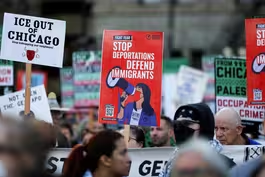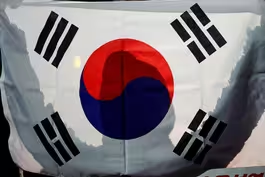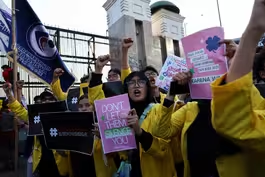
New book chronicles design legacy of the McKissack family
Clip: 9/7/2025 | 6m 21sVideo has Closed Captions
‘The Black Family Who Built America’ chronicles the McKissacks’ design legacy
For centuries, Black Americans’ significant contributions to architecture and design have often been overlooked. A new book chronicles the indelible mark one family has left on American construction since the mid-1800s. Ali Rogin speaks with Cheryl McKissack Daniel, author of “The Black Family Who Built America: The McKissacks, Two Centuries of Daring Pioneers,” for more.
Problems playing video? | Closed Captioning Feedback
Problems playing video? | Closed Captioning Feedback
Major corporate funding for the PBS News Hour is provided by BDO, BNSF, Consumer Cellular, American Cruise Lines, and Raymond James. Funding for the PBS NewsHour Weekend is provided by...

New book chronicles design legacy of the McKissack family
Clip: 9/7/2025 | 6m 21sVideo has Closed Captions
For centuries, Black Americans’ significant contributions to architecture and design have often been overlooked. A new book chronicles the indelible mark one family has left on American construction since the mid-1800s. Ali Rogin speaks with Cheryl McKissack Daniel, author of “The Black Family Who Built America: The McKissacks, Two Centuries of Daring Pioneers,” for more.
Problems playing video? | Closed Captioning Feedback
How to Watch PBS News Hour
PBS News Hour is available to stream on pbs.org and the free PBS App, available on iPhone, Apple TV, Android TV, Android smartphones, Amazon Fire TV, Amazon Fire Tablet, Roku, Samsung Smart TV, and Vizio.
Providing Support for PBS.org
Learn Moreabout PBS online sponsorshipJOHN YANG: For centuries, black Americans, significant contributions to architecture and design have often been overlooked.
A new book chronicles the resilience of one family who's left an indelible mark on American construction since the mid-1800s.
Ali Rogin spoke with Cheryl McKissack Daniel, CEO of the Construction and design company that bears her family's name and author of "The Black Family who built America: The McKissick's.
Two Centuries of Daring Pioneers."
ALI ROGIN: Cheryl McKissack Daniel, thank you so much for joining us.
Your family's legacy stretches back many generations.
It is anchored by a man named Moses McKissack.
Tell us about him.
CHERYL MCKISSACK DANIEL, Author, "The Black Family Who Build America": Moses McKissick was the first descendant from our family who came to this country in 1790 as a slave.
He was taught the trade of making bricks, and he resided in North Carolina.
His son was Moses McKissick II, he was also a carpenter and master builder.
He was actually given as a wedding gift to the Maxwell family, and they lived in Spring Hill, Tennessee.
And after emancipation, Moses McKissack moved to Pulaski, Tennessee, and that's when he first started our business.
The interesting thing about Pulaski, Tennessee, is where the Ku Klux Klan started.
This is the deep, deep south you mentioned.
ALI ROGIN: This is the deep, deep south shortly after emancipation, what sort of discrimination did your ancestors face in the early days of starting this firm?
CHERYL MCKISSACK DANIEL: In the early days, you know, they had many white patriots because these slave masters would help the slaves start their own business.
But it wasn't until later on the white people began to feel that blacks were a threat to them and their livelihood.
And so that's when the McKissacks begin to shift their clientele to the black communities.
So that was churches, that was black, historically black colleges, things of that nature.
ALI ROGIN: And what sort of barriers?
When you took over the company, as you did more than 150 years later, what sort of barriers did you face?
CHERYL MCKISSACK DANIEL: Well, when I first took over the company, it was the beginning of minority and women owned programs.
So I was definitely anomaly.
But most of the time the thought was that I could not provide quality work or I didn't know what I was doing.
I didn't have good staff, I didn't have funding all these things that are myths.
It was not true.
I came from a long line, as the book lays out, of builders and architects, so we definitely knew what were doing.
ALI ROGIN: Tell me about some of the projects that you are the proudest of over the course of your career.
CHERYL MCKISSACK DANIEL: Well, the first chapter of my book talks about the Barclay Arena, and I'm extremely proud of that project.
That project catapulted us into the transportation business, the rail business, because we had to move the rail where the trains were being stored to make way for the Barclay Arenas Foundation.
And so that was the beginning of our rail division, which then brought on clients like the MTA.
I'm also excited about our work at New York City airports, from LaGuardia to now the new Terminal 1 at JFK.
That's almost 3 million square feet of state of the art airport.
And we have been working on that project, I want to say, six years.
We've also done quite a bit of work for Columbia University Manhattanville Campus, EDC, which is the Economic Development Corporation.
We've been able to work with them to build the new state of the art Coney Island Hospital, which we are excited about and the same as the Harlem Hospital on 135th Street.
ALI ROGIN: You end the book talking about your hopes for black entrepreneurs to be able to pay it forward and create generational wealth and success.
What does that future look like to you?
CHERYL MCKISSACK DANIEL: Well, I believe that black businesses should focus on ownership.
I think that creates an ecosystem that can empower a whole community.
If we look at JFK Terminal 1, the owners there included Magic Johnson and Jim Reynolds from Loop Capital.
And as a result, the top of the food chain dictates how the rest of the project is going to work and who is going to work on it.
They wanted to have strong minority and women owned business participation.
And so that's how I see it playing out in the future.
More ownership.
ALI ROGIN: And you know, this book, it's not just a memoir.
It's not just your story, but it's also a reframing of who Built America.
What do you want readers to take away from reading this story?
CHERYL MCKISSACK DANIEL: Everyone can have a legacy.
My interest in my family story started with just a family tree that my grandmother had in her Bible that I got my hands on.
And it was so exciting to me that I filled it out with the rest of our generations, my generation, my kids generation.
And I just think it's important that we document where we came from.
So I hope readers can take that away.
ALI ROGIN: The book is the Black Family who built America.
Cheryl McKissick, Daniel, thank you so much for joining us.
CHERYL MCKISSACK DANIEL: My pleasure.
Chicago braces for federal crackdown as Trump stokes tension
Video has Closed Captions
Clip: 9/7/2025 | 6m 35s | Chicago braces for federal crackdown as Trump stokes tensions on social media (6m 35s)
News Wrap: South Korea, U.S. reach deal to release workers
Video has Closed Captions
Clip: 9/7/2025 | 3m 3s | News Wrap: South Korea negotiates release of workers detained in U.S. raid (3m 3s)
Why violent protests are sweeping across Indonesia
Video has Closed Captions
Clip: 9/7/2025 | 6m 54s | Violence sweeps across Indonesia amid protests over worsening economy (6m 54s)
Providing Support for PBS.org
Learn Moreabout PBS online sponsorship
- News and Public Affairs

FRONTLINE is investigative journalism that questions, explains and changes our world.

- News and Public Affairs

Amanpour and Company features conversations with leaders and decision makers.












Support for PBS provided by:
Major corporate funding for the PBS News Hour is provided by BDO, BNSF, Consumer Cellular, American Cruise Lines, and Raymond James. Funding for the PBS NewsHour Weekend is provided by...


